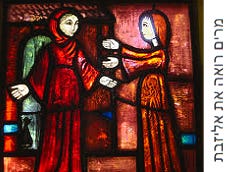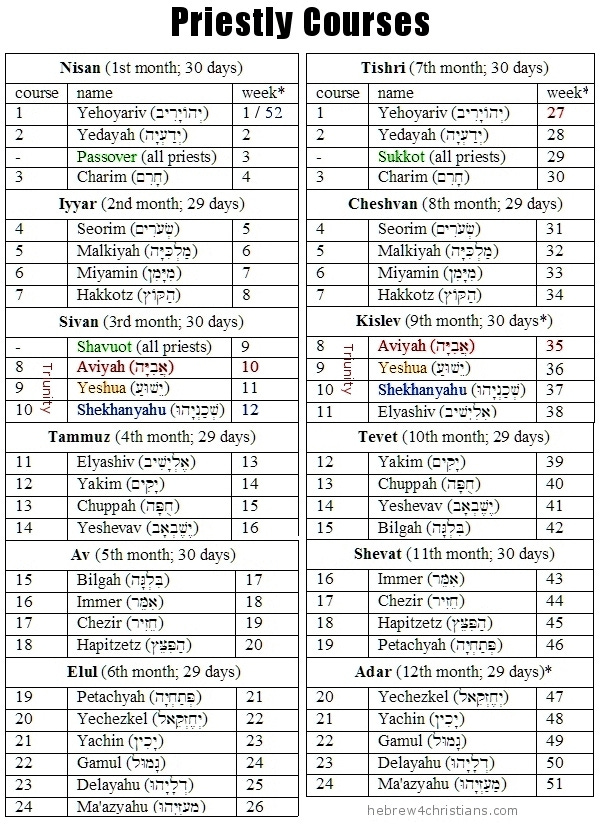Was Jesus (Yeshua) really born on December 25th, as Western Christian Tradition maintains, or does the careful study of Scripture allow us to infer a different time for His advent here on earth? Two cases can be reasonably made: one case for a Tishri (Sukkot) birth, and the other for the traditional late December (or early January) date. As I hope you will see, the crux of the arguments both for and against the late December dating of the birth of Yeshua depend upon when we think Zechariah (John the Baptist’s father) was in the Temple when he was visited by the angel Gabriel (Luke 1:5-80).
First we need to understand that King David divided the sons of Aaron (i.e., the priests) into 24 “courses” or groups to create an orderly schedule by which the Temple of the LORD would be staffed for the given year (1 Chr. 24:1-4). Once these courses were established, lots were drawn to determine the sequence each group would serve in the Temple (1 Chr. 24:7-19) beginning with the first course in the Spring on Nisan 1 (i.e., Rosh Chodashim). According to the chronicles each of the 24 courses of priests would begin and end their service on the Sabbath day for a tour of duty of one week (2 Chr. 23:8, 1 Chr. 9:25).
The Jewish calendar begins in the spring (i.e., Nisan 1), so the first course of priests would serve for seven days, and then on the following week the second course would serve. The third week would mark the festival of Passover when all priests would be present for service, so the schedule would be suspended until the following week when the third course of priests would serve. The weekly arrangement would then resume until the next major holiday of Shavuot (Pentecost) arrived, and then the schedule was suspended again for the ninth week. By the tenth week the eighth course (of Aviyah, meaning “My Father is Yah”) would be called for Temple service and the courses would continue without further interruption until the 24th course was completed (see the table below). Note that after the 24th course served, the first half of the calendar would be complete and the schedule would then reset for the second half of the year. By means of this arrangement each group of priests would serve in twice per year (in addition to the three major festivals of Passover, Shavuot, and Sukkot).
This weekly schedule of the Temple service allows us to infer the birth date of both John the Baptist and thereby the birth date of Yeshua the Messiah. Of particular interest is the eighth course of the priests, called the “Course of Aviyah” (mentioned in 1 Chr. 24:10) which was the course that Zechariah served (see Luke 1:5). Now since the eighth course would serve either during the month of Sivan or later during the month of Kislev (see the table above), we have two possibilities regarding establishing the birth date of Yeshua the Messiah.
First, if the visitation of Gabriel occurred during Zechariah’s first course of service (i.e., the 10th week), then John would have been conceived sometime during the month of Sivan (Luke 1:23-4), and adding 40 weeks to this (the normal time of human gestation) John would have been born sometime in the month of Nisan, perhaps around the time of Passover. Furthermore, since Yeshua was conceived six months after John was conceived (Luke 1:24-27, 36), adding six months (or 24 weeks) to the end of Sivan implies his miraculous conception would have occurred in mid to late Kislev (near the time of Chanukah). Adding 40 weeks to this (again, the approximate time of human gestation), Yeshua then would have been born sometime in the month of Tishri, during the season of Sukkot (i.e., “Tabernacles”).
On the other hand, if the visitation by Gabriel occurred during Zechariah’s second service (i.e., 35th week), then John would have been conceived after Yom Kippur (Luke 1:8-23) and born 40 weeks later during the month of Tammuz. Again, since Yeshua was conceived six months after John was conceived (Luke 1:24-27, 36), adding six months (or 24 weeks) would imply he was conceived during Passover and was born later during the month of Tevet, that is, sometime in late December. According to church historians, this was the original view of the early church.
So there you go. If you have followed my reasoning, it is clear that Yeshua could have been born either near the holiday of Sukkot to celebrate God “tabernacling” with humanity, or he could have been born in late December, perhaps near the Fast of the Tenth of Tevet which remembered the destruction of the Temple in Jerusalem. There are perhaps other options as well, but I believe God meant for the issue to be a bit obscure because He came into the world in disguise -- the Lord of Glory given in swaddling clothes... Hallelujah!
Isaiah 9:6
כִּי־יֶלֶד יֻלַּד־לָנוּ
בֵּן נִתַּן־לָנוּ
וַתְּהִי הַמִּשְׂרָה עַל־שִׁכְמוֹ
וַיִּקְרָא שְׁמוֹ פֶּלֶא יוֹעֵץ
אֵל גִּבּוֹר אֲבִיעַד שַׂר־שָׁלוֹם׃
For unto us a child is born,
unto us a son is given;
and the dominion shall be upon his shoulder;
And his name shall be called:
‘Wonderful Counselor,’
‘Mighty God,’
‘Father of Eternity,’
‘Prince of Peace.’
Isa. 9:6 Hebrew page (pdf)
Concluding Addendum
The fact that various church groups have chosen different dates to memorialize certain historical events (such as the birth date of Jesus) is something we simply must tolerate, especially because the Scriptures do not provide enough information to conclusively determine the matter, and therefore we must exercise “epistemic humility” and follow after peace (Heb. 12:14).
It should be noted, however, that the early church recognized the later December dating (rather than a Sukkot date), though assuredly not because of any pagan influences (such as Saturnalia or Roman sun worship). Indeed the early church suffered terrible persecution from the pagans in Rome and there is no historical evidence that they sought to assimilate with any of the pagan customs of that time. The suspicion that Christianity “appropriated” pagan culture to celebrate the birth of Christ actually first arose during the so-called “Age of Enlightenment” (17th century) when the use of human reason and the scientific method were dogmatically declared to be the only way to truth...
The question of the date of Jesus’ birth is not one regarding his empirical reality and the historicity of the gospels, since these are not seriously questioned by honest historical scholars. However the Scriptures accommodate divergent convictions on such matters, as Paul gave the principle: ῝Ος μὲν κρίνει ἡμέραν παρ᾽ ἡμέραν, ὃς δὲ κρίνει πᾶσαν ἡμέραν. ῞Εκαστος ἐν τῷ ἰδίῳ νοῒ πληροφορείσθω - “One person esteems one day as better than another, while another esteems all days alike. Each one should be fully convinced in his own mind” (Rom: 14:5). “So then let us pursue what makes for peace and for mutual upbuilding” (Rom. 14:19).
You may not agree with my thinking on the subject here, but if you want to make a case for a different date, then do your own careful research on the question. Read the relevant Hebrew texts, do the math, consult the Jewish calendar, read the New Testament, check the Greek, and then determine whether you think Zechariah was serving at the Temple during the month of Sivan or later, during Tishri, perhaps during the time of Yom Kippur. As always, Shalom!
Postscript:
This topic sometimes brings up contention, probably because many sincere Christians are turned off by the commercialism and phony glitz of “Hollywood-style” Christmas which completely disregards the tremendous significance of God becoming a man and giving up His life for our redemption... I get it. However, if you want to “push back” against the world, you ironically run the risk of disregarding the miracle of the story of Yeshua and His birth as well!
Even though the world has “culturally appropriated” Christmas and made it into a farcical "feel-good" holiday, those who truly love the Lord want to honor the blessing of His life, and it is therefore good to give thanks to God for the advent of Yeshua at this time (and during other times as well, including Passover, Shavuot, and of course Sukkot). Redifat Shalom!






Thank you for this well-reasoned and clear article. Another moreh I follow has also calculated into the discussion the position of the stars during the period of 7 BCE through 1 CE, using a sophisticated computer software that can “run back” the wheel of stars in the heavens to any point in history. He has concluded a Sukkot birth for Yeshua, in 5 BCE. Regardless, as you have so aptly said, it is not edifying to be divisive among our family of faith, on such matters. Some obscurity is ok. Thank you for all your wonderful scholarship, Rabbeinu! Merry Christmas and Happy Hanukkah!
Thank you for this. 🤍🙏🤍
May I ask, do you speak/minister in a church?